- Home
- Nancy Pickard
The 27-Ingredient Chili Con Carne Murders: A Eugenia Potter Mystery Page 17
The 27-Ingredient Chili Con Carne Murders: A Eugenia Potter Mystery Read online
Page 17
“Taco, what’s the matter with your leg?”
She slipped into his stall and worked her way toward the rear, carefully stepping over a steaming pile of fresh manure, toward the left hind leg he had lifted.
“Oh, my, you poor thing!”
Dark, dried blood coated the leg.
“Didn’t they see this last night?”
But perhaps the men had not noticed this blackened wound as they brought the horse in. His coat was dark, the blood would have been hard to see. Surely the horse had limped, but … well, they had just missed it, that was all, because it was night and because they’d brought him back in one of their horse trailers instead of trying to ride him.
Mrs. Potter went to find a bucket, which she filled with water, regretting for Taco’s sake that it was so cold. She found a clean rag and carried everything back with her to his stall.
“I’ll be as gentle as I can, boy, but we have to see what’s wrong.”
It was impossible to tell under all the blood on his leg just how bad the wound was, and exactly what might have produced it. Had he stumbled, fallen onto a sharp boulder? Mrs. Potter soothingly stroked the horse’s nose and neck for a few moments before bridling him and tying him securely to a ring in the stall. She wanted his nose secured in a face-forward position so that if she inadvertently caused him pain he couldn’t turn and nip at her. She then worked her way back to his hindquarters slowly, stroking his sides, taking the bucket with her. After dipping the rag in the water and squeezing some of it out, she tentatively touched the rag to his leg. Taco didn’t seem to mind that small touch, so she increased the pressure a bit and stroked the wet rag down the leg.
“Easy, boy, easy now.”
He began to mind the operation very much, whinnying and snorting, and moving nervously by touching the wounded leg to the stable floor, then jerking it back up into the air again. But he was an excellently trained horse, Mrs. Potter knew, and she felt fairly confident that he would stand relatively still for her ministrations. His beautiful thick tail whipped back and forth unhappily. Mrs. Potter put up her left arm to keep it out of her face.
When she finished wiping his leg clean, she was appalled at what she saw—and respectful of the horse’s courage in withstanding such pain. By cleaning the leg, Mrs. Potter had revealed a long, ragged gash in it. The light in the stable wasn’t good enough for her to tell how deep the cut penetrated and she was afraid to stick her face any closer. Taco, for all his stoicism, was clearly sending her the firm message: Enough already!
Carefully, she backed against the wooden wall of the stall, carrying the bucket with its load of filthy water with her. She edged her way back out into the corridor, then released him from the tether.
“Were you stabbed, boy? Or could you have been gored?”
That’s what it looked like, as if the horse had been gored by an animal’s tusk, or had actually been stabbed by a knife-wielding human. Mrs. Potter glanced around, looking at the wooden sawhorse where the other saddles usually rested, but she didn’t see Linda’s there; then she remembered that Charlie Watt said he didn’t know what Ken had done with it.
“We have to get the vet out here for you.”
Mrs. Potter stroked the horse a little longer, calming him and whispering endearments to him before she picked up her bucket and started to walk outside with it to toss its contents onto the ground.
“Patrona?”
She glanced up at the sound of a young woman’s voice.
“Angela,” she responded gently, seeing who it was. There in the doorway of the stable stood Ricardo and Juanita’s youngest daughter, the one who was an accountant in Tucson. Angela Ortega’s mass of black curls sprang uncombed around her pretty face, and she looked disheveled in red plaid pajamas and the incongruous addition of a pink satin bathrobe. “How are you, my dear?”
“I saw your car up here,” the young woman blurted. “I came to tell you.” She began to cry. “Oh, patrona. Bandy’s dead. Ken found him.”
Since Angela had run up to the stable in her bedroom slippers, Mrs. Potter gave her a ride back down the hill. They walked into the Ortega house together. Bandy. And two young illegals. Dead. Too many tragedies, all in a row. However shall we survive it? Mrs. Potter felt numb, as if she had lost all feeling and this were happening to someone else, not to her. She wondered, in a detached sort of way, when she would begin to feel the impact of this fresh loss. And then she saw the Ortega children, and she thought, My loss is nothing compared to theirs.
The first thing Mrs. Potter noticed about them was how full the house seemed with all of these “children,” grown to adulthood. Where once they’d filled the house with their squealing laughter and wailing tears, now they seemed literally to fill it with all of their grown-up heights and weights and voices. The two “boys,” Ricardo, Jr., and Manuel, were over six feet tall, like their late father, and almost as handsome as he had been. But then, Mrs. Potter thought, I’m prejudiced, since I have always agreed with Juanita that Ricardo, Sr., was the handsomest man in the valley. And the “girls,” why, they were still stair steps, starting with the smallest and youngest, Angela, and going on up to Estella, who was the oldest child, and the tallest of the women. Francesca, the middle girl, who was Linda’s mother, was still in Brazil.
By one of those unplanned coincidences that works as well as a potluck dinner, none of the married ones had brought their spouses or children. Each, she learned later, had felt the house was too small to hold them all, each had thought the events too upsetting for their children to attend, and each couple had determined that one spouse needed to stay home, take care of the children, and keep working. So the Ortega children were—probably for the first time in many years—all together, solely as brothers and sisters, under their parents’ roof.
It had been Ricardo’s secret sorrow—told, at least, to Mrs. Potter—that not one of them had chosen to make a life out of ranching in the valley. But then he had Linda.…
“Have you reached Linda’s parents?” Mrs. Potter had asked Angela on the ride down, and had been told no, they were still trying, always trying, they’d sent word, but now they had to wait until one of their messages got through. In the meantime it was agonizing to them that Linda’s mother didn’t know, that Francesca wasn’t here with them.…
“Patrona,” Mrs. Potter was greeted, and she went to each of them for a handshake or an embrace. “Lo siento,” she murmured over and over. “Lo siento mucho, lo siento acerca de su padre.”
I am so very sorry about your father.
Mrs. Potter was struck by the contrast Ken Ryerson made to the family of his fiancée. Do they know? she wondered. Something about the emotional space between them made her think: no, he hasn’t told them yet. Seated on a couch in the living room, his head bent over into his hands, the young cowboy looked unattractively pale next to the vividness of the Ortega family. But that was unfair, Mrs. Potter chided herself. Obviously he was still sickened by what he had seen in Bandy’s apartment. Her own stomach felt queasy at the thought of it, and she hoped she would never have to hear the details. Mrs. Potter crossed the room to sit beside him.
“Are you all right, Ken, dear?”
He took a deep, shaky breath, but offered a wry grin as he said, “I don’t think so.”
You’ll be all right, Mrs. Potter thought, seeing his bravado attempt at a grin. Still, it was awful for him, to walk into that room of terrible death. Food poisoning, Angela had suggested, based on what Ken had told them, or maybe even a virulent influenza. Surely not, Mrs. Potter thought. Whoever heard of the flu catching its victims and killing them in their tracks, like that?
“Where’s your mom?” she asked the others.
“Mom!” one of the “boys” called, as boys always will, Mrs. Potter thought.
Angela walked into the kitchen to get Juanita, but she came back in a minute, saying, “She’s not in there. Check her room, Rico.” Ricardo, Jr., left the living room to do as his little sister suggeste
d. But he, too, came back without their mother.
“I’ll look upstairs,” Estella offered.
But in a few moments she was back, too, spreading her hands wide in bafflement. “She’s not in any of the rooms upstairs. I guess she’s in the bathroom down here—”
“No, she’s not,” Rico said. “I checked.”
“Well, where is she?” Manuel asked.
“Everybody go look,” Angela directed, and the Ortega children dispersed to look for their mother. One by one, they straggled back to the living room, each of them looking as if they expected one of their siblings to produce their mother.
None of them did.
“This is ridiculous,” Angela pronounced. Although the youngest, she also seemed to be the spunkiest, the most outspoken. The most, Mrs. Potter thought again, like her mother. “Where is she?”
None of them could answer that. Juanita Ortega wasn’t in the house—not the basement, not the attic—and she wasn’t anywhere they looked in the yard.
“But she was here just a minute ago, right before Angela came back with Mrs. Potter!” Estella exclaimed. “She can’t have gone anyplace! The cars are all here. And anyway, she was still in her nightgown, for heaven’s sake!”
Mrs. Potter, like the Ortega children, began to wander about the house, doing everything but opening drawers and cabinets to look for their mother. In the kitchen, she saw that somebody else had been opening drawers and doors—the door to the broom closet was open and a pile of brown paper grocery bags had spilled to the floor. The door to the supply shelf under the kitchen sink was wide open too.
“Maybe she’s gone off by herself to cry,” Rico said.
“Mother?” Estella retorted.
They all seemed to agree that scenario was an unlikely one.
Begging the question: where was Juanita, and why had she picked this moment to disappear? None of them, Mrs. Potter noticed, including herself, appeared willing even to broach the idea that not being able to find a grown woman—one who was last seen in her nightgown in her own house—had anything to do with the deaths of their father, the old man, and the two young Mexican illegals, or the disappearance of their niece, Linda.
“I have to git.”
Ken stood up abruptly, drawing their attention back to him. His complexion was still as pale as the lighter blond hairs in his mustache, and his mouth was still set in a tight line that suggested he was holding back nausea. “I’ve got to get out to the windmill.”
“We ought to concentrate on the area where you found Taco,” said Manuel, and other heads nodded in agreement. When Estella objected, “But what about Mama?” Manuel said, “I’m not worried about Mama. She’ll turn up.”
“But what if she doesn’t?” Estella insisted.
“Taco!” Mrs. Potter exclaimed. “I almost forgot. Ken, do you realize he’s badly wounded? His left rear leg. Looks like he got gored, or—” She halted, not wanting to say “stabbed” in front of these uncles and aunts of Linda, who might hear the word and leap to a logical and terrible conclusion about their niece. “I cleaned the wound as well as I could, but we’ll have to get the vet out here. I couldn’t tell if it went to the bone. I’m just hoping we can relieve the poor thing’s suffering without losing him altogether.”
Ken headed for the door with the Ortega men, saying, “You’ll take care of that, patrona?”
“Yes, but wait …” She looked around the room, at the unhappy, worried faces of the young people. “Did anybody call the sheriff about Bandy and those two poor lads?”
“Mama did,” Angela told her. “He’s on his way here anyway to take over the search for Linda, now that Papa …”
“He’ll need to talk to you, Ken,” Mrs. Potter said.
“He can find me,” Ken replied, as he, Ricardo, and Manuel left the house.
“I can’t believe you two!” screamed Estella through the screen door. “You call yourselves sons? How can you leave without knowing what’s happened to Mama?”
Rico turned back. “We’ll look for her, Stella! On our way to the windmill. What do you think we’re going to do, close our eyes? Calm down! Nothing’s happened to Mama. She can probably hear you screaming right now. If that doesn’t bring her running back, there’s nothing we can do that will!”
Soon the women heard the sound of Ken’s truck starting up and leaving the yard. Mrs. Potter used a telephone extension in the living room to call the nearest large-animal veterinarian, who promised to come out as soon as she could get away from her clinic.
Estella, who was tall and handsome like her father, sank down on an easy chair and began to cry into her palms. When Mrs. Potter went to comfort her, the young woman whispered, “They don’t know anything, my dumb brothers. Where is she? How could she do this, just walk away like that? Has she gone loco? I wanted to go look for Linda, too, but how can we go, when now we have to stay here and look for her? We don’t need this! Doesn’t she realize that? Why can’t she think of us? Papa’s dead. Linda’s gone. Now Bandy and those pobrecitos.” (Poor little boys.) “How could she be so selfish, to worry us like this? Why doesn’t she just come back from wherever she’s hiding? I could kill Mama for doing this to us.”
The small, furious figure of Angela Ortega appeared briefly in the doorway between the kitchen and the living room.
“You’d think people could clean up their own messes,” she said, her pretty face tight with resentment. “You’d think people could close the broom closet door after they open it. And shut drawers. And close the door under the sink. And pick up paper bags if they spill them. You’d think if we all have to live here together again for a couple of days, people could pick up after themselves. You’d think so.”
She stomped back into the kitchen, and soon Mrs. Potter heard the sounds of doors and drawers being jerked open and slammed shut, and then Angela yelled, “Who hid the Lysol? Where’d somebody put the Comet? Where the hell is the darn mop? How can I clean up after you all if I can’t find anything?”
Mrs. Potter thought, It’s too much for this family to bear.
She left Estella on the couch and walked into the kitchen, where she found Angela down on her hands and knees scrubbing the linoleum floor so hard it looked as if she were trying to rub the pattern off.
“You remind me so much of your mom,” Mrs. Potter told her gently. “When she’s the most upset, that’s when she works the hardest too.”
For a moment, Angela’s hands kept pushing the sponge, but then they stopped. She looked up at Mrs. Potter and Mrs. Potter stared down at her as they both had the same appalling thought at the same time.
“Oh, my God!” Angela said. “You don’t think so?”
Mrs. Potter nodded grimly. “Did you look there, any of you?”
“I didn’t. I’m sure nobody else did, either.”
Angela started to get up off her knees.
Mrs. Potter stopped her with a gesture. “No, dear, let me do this, please. I’ll find her. I’ll talk to her.”
CHAPTER 22
From the bottom of the stairs leading to Bandy’s apartment, Mrs. Potter heard the sound of water running upstairs. There were twelve steps going up and Mrs. Potter’s imagination worked overtime on every one of them. But when she drew near to the last step, she smelled only the fresh scent of cleaning solvents. A cold breeze reached her, telling her that Juanita had opened the windows to the cleansing air of the morning. Still, Mrs. Potter braced herself before stepping into the room.
“Juanita, dear.”
The other woman was startled by Mrs. Potter’s sudden appearance, and she jumped up guiltily. Juanita had pulled on a pair of Bandy’s old jeans, and wore one of his sweatshirts on top of that. On her feet she still wore her bedroom slippers—just like her daughter Angela, who looked so much like her and who was also down on her hands and knees in a kitchen, trying to scour her own grief away. Juanita’s silver hair was tied up into a ponytail with a piece of string whose ends dangled down the back of her neck.
“I know, dear.” Mrs. Potter looked around, and her heart filled with sorrow for Bandy and compassion for the bereaved woman who stood like a sentry with a mop in one hand. On the counter by the sink sat the missing bottle of Lysol, along with the missing can of Comet; there was a brown paper bag on the floor, which Juanita had used as a container for the cleaning supplies she had brought over from her own house. Bandy’s body lay faceup on his narrow bed, and the bodies of two other men—Oh, they were no more than boys! Mrs. Potter thought—lay on cots near him, the cots he kept folded up for just such visitors. Their eyes were closed, their brown hands folded over their chests. They were dressed in clean, neat shirts and trousers, and there were socks on their feet, though no shoes. “You changed their clothing and washed their bodies, didn’t you?”
“I couldn’t leave them like that.”
“And you’ve washed the floor, haven’t you? And the dishes.”
“I washed everything,” Juanita stated flatly. “Dishes, floor, table, chairs, bathroom, walls. Took their clothes outside to the incinerator and burned them.”

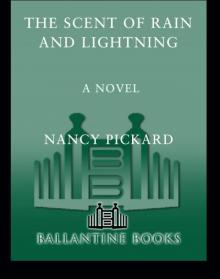 The Scent of Rain and Lightning
The Scent of Rain and Lightning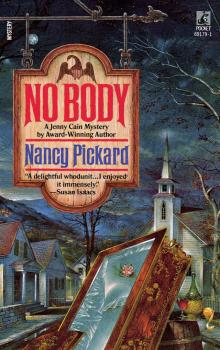 No Body
No Body The Secret Ingredient Murders: A Eugenia Potter Mystery
The Secret Ingredient Murders: A Eugenia Potter Mystery The 27-Ingredient Chili Con Carne Murders: A Eugenia Potter Mystery
The 27-Ingredient Chili Con Carne Murders: A Eugenia Potter Mystery Twilight
Twilight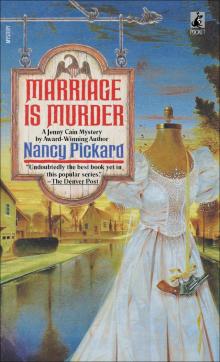 Marriage Is Murder
Marriage Is Murder I.O.U
I.O.U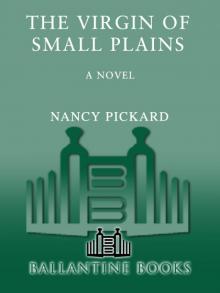 The Virgin of Small Plains
The Virgin of Small Plains Generous Death
Generous Death The Whole Truth
The Whole Truth The Blue Corn Murders
The Blue Corn Murders Say No to Murder
Say No to Murder Confession
Confession Dead Crazy
Dead Crazy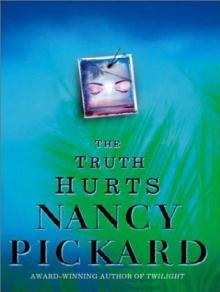 The Truth Hurts
The Truth Hurts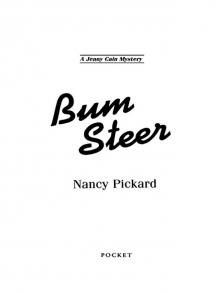 Bum Steer
Bum Steer